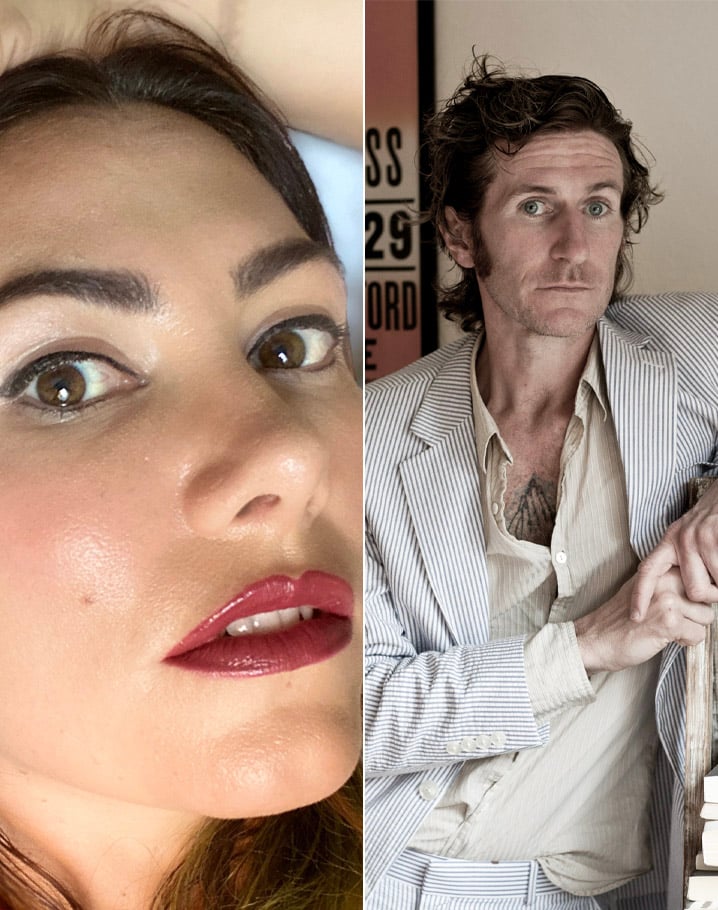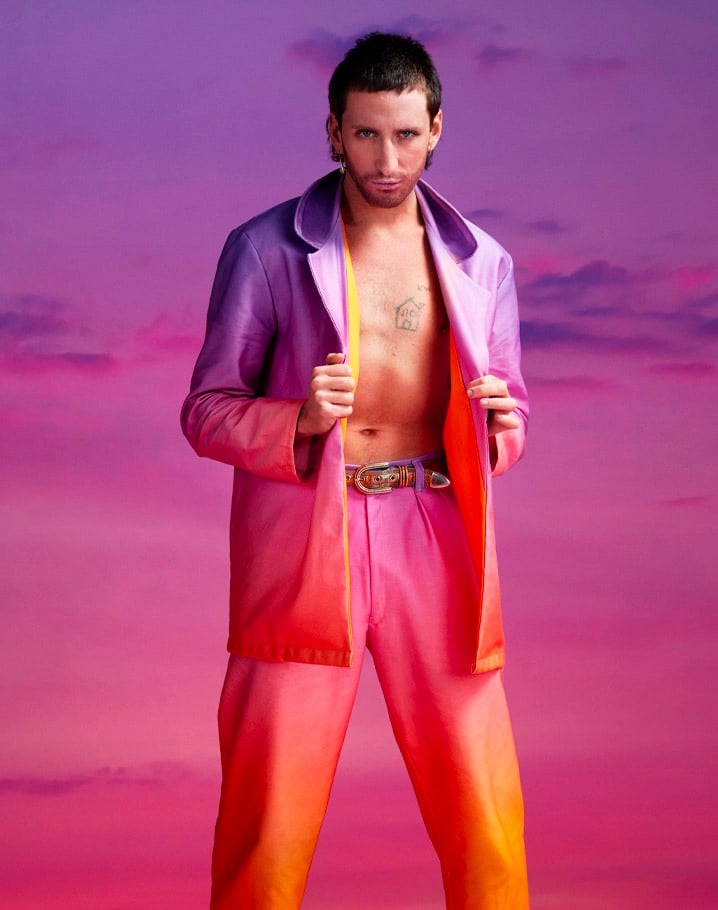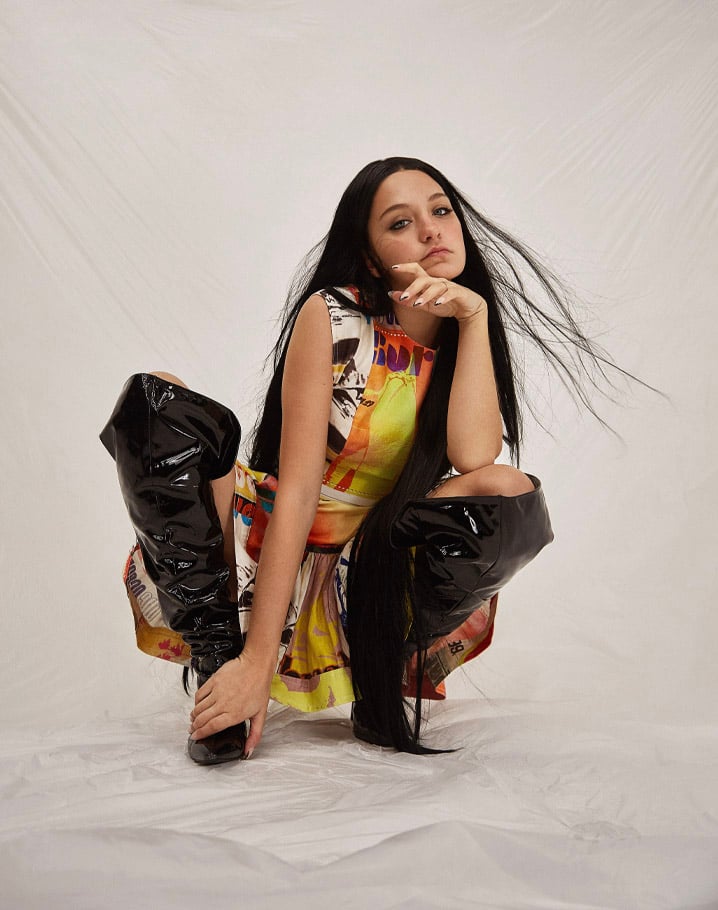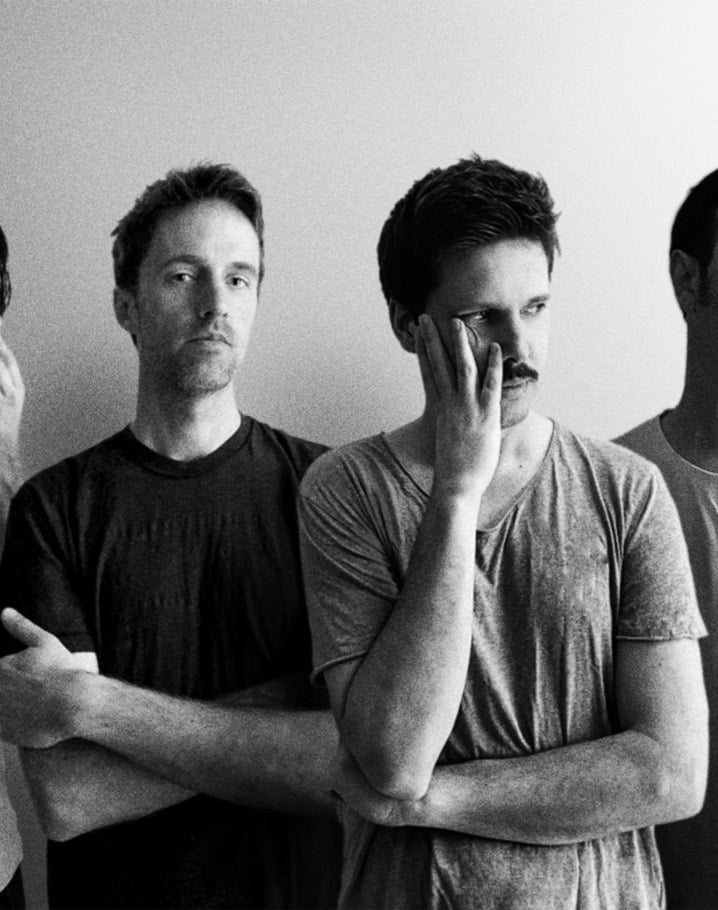Rolling Stone’s 50 Greatest Australian Artists of All Time
For as long as music has existed, so too have artists, and corresponding opinions about which of these artists is better. Any sort of discussion about music and varying degrees of greatness is guaranteed to become one of the most contentious topics imaginable, but often, these heated discussions about music tend to overlook the exceptional artists born and bred in our own backyard.
In a year when a global pandemic has emptied stages the world over, and musicians need support more than ever, we felt it was time to set our sights on the Australian names who have helped put local music on the map here and abroad. Thus, the idea for the 50 Greatest Australian Artists of All Time was born.
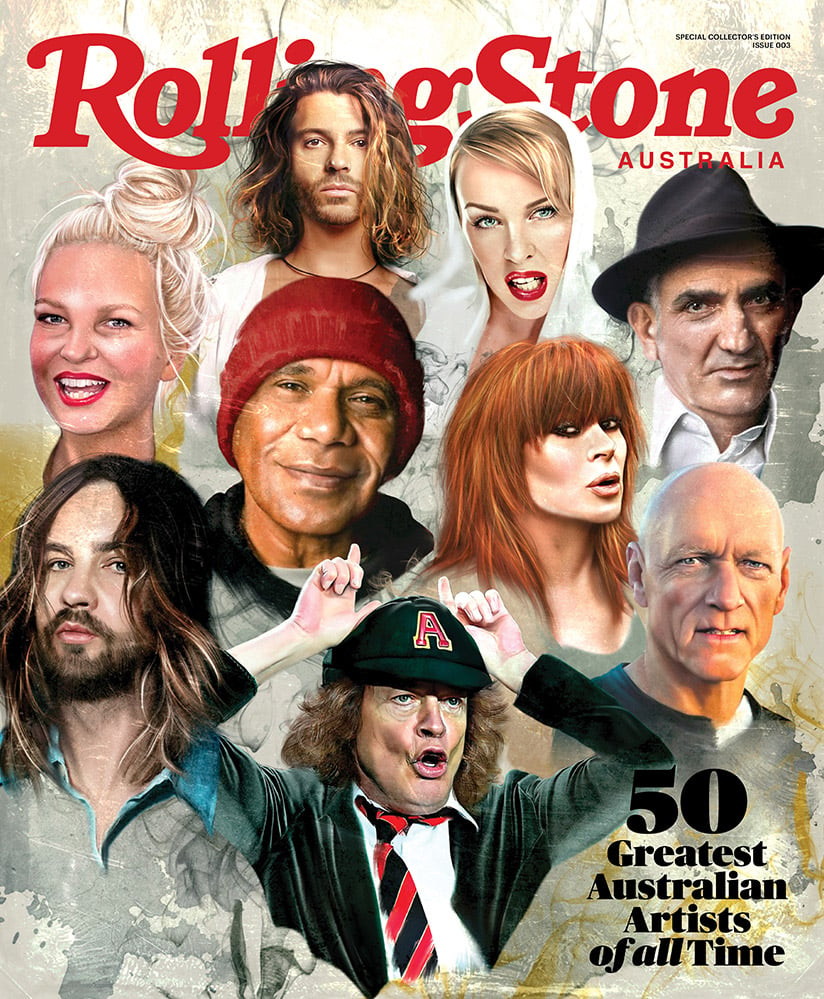
Cover illustration by Debb Oliver.
Originating as an idea for an online feature, our vision soon became more grandiose. Before long, we were receiving and tabulating suggested inclusions of hundreds of Australian artists, from critics, music industry figureheads, past Rolling Stone Editors and writers. This list has been laboured over by some of the most respected names in music.
Paired with testimonials from fellow artists, whether they be veterans or contemporaries, the result is a list which is bound to be one that generates countless hours of discussion and debate but one that also seeks to honour the immeasurable musical contributions from artists that call Australia home.
Their legacies may be long-lasting, or they may be names helping to bring newfound focus onto this great southern land, but at the heart of it all lies an inextricable link with the musical fabric of Australia.
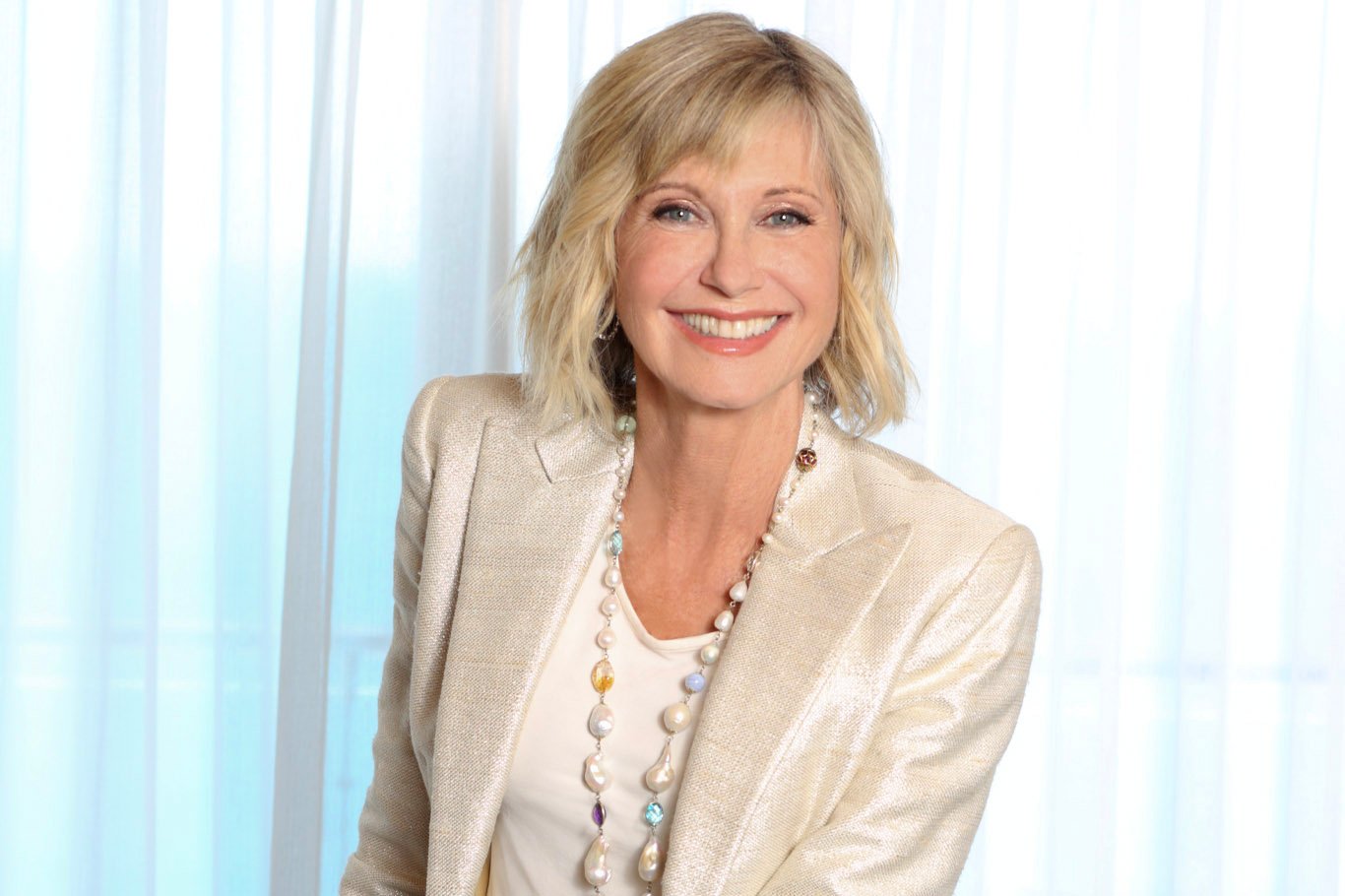
Olivia Newton-John
The year is 1961 and we are having our class photo taken for Christ Church Grammar School in Melbourne, Victoria.
I am the first boy in the third-from-the-bottom row on the left-hand side. The fourth girl along the same row is Olivia, next to Jonathan. We actually were boy/girl friends for a very short period of time.
In 1963 my family moved to Sydney and contact was lost with Olivia and all my school friends.

It wasn’t till the late Sixties that I heard that Olivia was a singer, which surprised me as I had never heard her sing at Christ Church Grammar School.
It was 1971 when Olivia had success with “If Not For You”, and it was then that I realised that she was a great singer and that she was the girl in my class at school.
"...it was then that I realised that she was a great singer and that she was the girl in my class at school."
It’s funny, or fortuitous, how things work out, and in 1978 I went to Los Angeles with Roger Davies who managed Sherbet and lo and behold he ended up managing Olivia. How cool is that?
I remember “Physical” and then there was the movie Grease, and so many great songs after that.
Dame Olivia has had incredible success over the years and besides her many recording achievements and awards that she has won, including four Grammy Awards, she turned her attention to helping people.
She was such an inspiration to so many people after she won her battle with breast cancer and further health issues after that.
I feel that she has left (so far) a legacy of undeniably great songs and so many achievements in the entertainment world, but I think that what she has created with the Olivia Newton-John Foundation and her dream to help find kinder cures for cancer has left a legacy that will endear her to all of us forever.
Love Daryl.
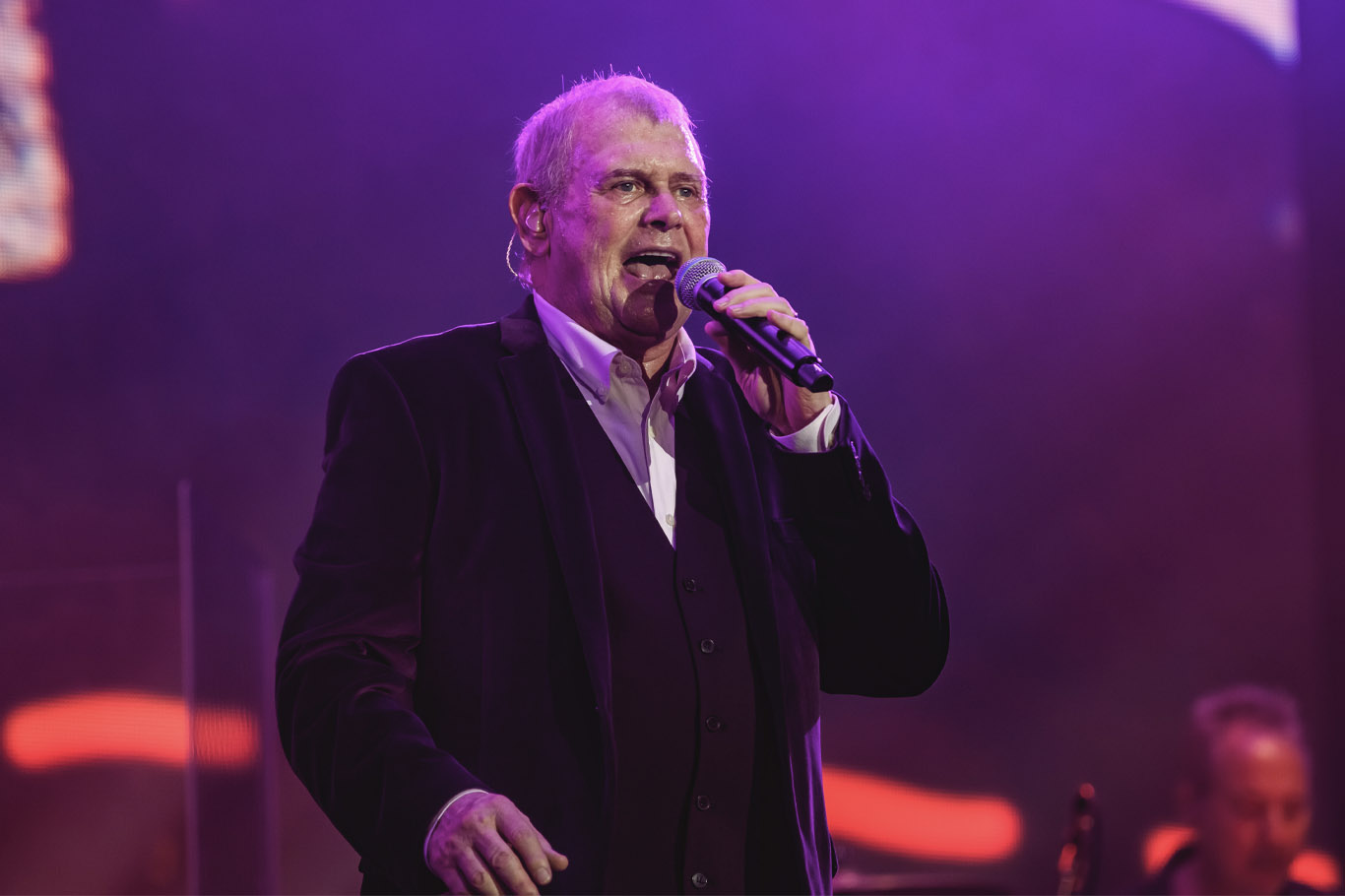
John Farnham
To the only man I’ve ever loved,
(Alexa, play Aretha Franklin’s “I’ve Never Loved A Man (The Way I Loved You)”.)
John Farnham. I remember the first time I’d heard your name. I was just a kid. It was maybe in 2001. My parents had been talking about your Big Top tent concert for weeks… There was immense anticipation for the show as it was your “Last Time” tour. Meaning, you were never to perform again. I had never heard of you before… But my parents and the entire city of Wollongong (and the entire South Coast, I imagine) were talking about you and your upcoming, very last concert.
My brother and I were left home alone with subpar McCain Hawaiian frozen pizzas and cookies-and-cream ice-cream for dessert. Left to fend for ourselves whilst my parents were jetting off to what seemed to be a once-in-a-lifetime opportunity.
My parents came home electric. My mum, Therese, is notoriously a gas-bag and my dad is renowned as “Silent Ken” and for both of them this was a new level of chat. Like bumblebees on Red Bull, they sped through everything that they treasured about you. Your elastic vocal range. Your presence. Your wit. Your flowing locks in the Eighties-esque stage fan. Temporarily, it seemed like my mum had even replaced Jesus with you, Farnham. You were a Sandridge household staple piece (and/or God). You were a man and/or pillar of the people.
After such hype, “Two Strong Hearts”, “Pressure Down”, and of course, “You’re The Voice” quickly became familiar to me and also became my favourite songs growing up. My dad spun Whispering Jack on the old player and in the car. You sat alongside the good company of Fleetwood Mac, Jackson Browne, and KC and The Sunshine Band. And… I had started to feel what could only be described (in 2020) as FOMO (that is, the Fear Of Missing Out, for any readers aged 45+). But, alas you were to never tour again. My teenage heart sunk, and I turned to the Jack Johnsons and Blink-182s of the musical world. I decided to buy a blue guitar on eBay and attempt to learn. I tried to learn how to sing with a cassette recorder, and learnt your songs one after the other. Thanks to Ultimate-Guitar…
"I tried to learn how to sing with a cassette recorder, and learnt your songs one after the other."
Five or so “Last Time” tours later…
At 24, I found myself covering “You’re The Voice” for triple j’s Like A Version. Many bros hated it. I do understand, the song carries great weight for “the Nation”. I received a tweet from you saying that you liked my version (I died and came back to life, I could now die a happy woman)!
Alas, they say if you love someone you should let them go and if it’s meant to be, they will surely come back to you. And so I did. I attempted to move on. And the stars aligned. I somehow found myself on the same line-up as you at Falls Festival, Byron Bay 2020. By this point in time, I had built up seeing you live for so many years. Admittedly, I was more excited for your set than my own. It was perfect. You had the same backing vocalists from the Eighties. They flaunted floor-length sequin gowns, you were charming as expected and the hair in the Eighties-esque fan still remained as part of your live schtick (only a little wispier than when my parents saw you play, I imagine).
John, you were and are truly Australian rock-pop at its finest… I am glad that we have not met in person, although I’m sure you’d live up to the idolisation. Nonetheless, I thought I should send you this love letter as COVID-19 lockdown has put life and time into perspective.
With all my Sandridge love,
B x

Divinyls
I fell in love with Divinyls twice.
The first time was as a kid in the country when “I Ain’t Gonna Eat Out My Heart Anymore” thumped out of Rage one Saturday morning. I was hypnotised by Chrissy’s fecundity. Witnessing the swagger of a full-grown woman slice through the surrounding early Nineties teeny bops like butter activated something in my core. The song was on the Buffy the Vampire Slayer soundtrack too, which was very cool.
The second time was as a 20-something frequenting my local in North Melbourne where
Aus rock was often blasted. The harder, punkier edge of their early material was revealed to me then and I marvelled at the wildly clever song-writing. I bought a “Best Of”, as you do, and marinated.
Most of my biggest musical influences until then had come from my parents’ record collection. But not this time. I had found my band, out in the wild. Divinyls were the ultimate expression of a few of the themes I wanted to explore in Killing Heidi – the powerful, angry young woman, regional isolation, sexual frustration.
"For lovers of rock with pop smarts or pop with a rock heart, I don’t think their mantle can be challenged."
Their influence on us was never overt, which I’m happy about, but I deeply connected to their energy and theatrical attack. The use of costumes, props, the way the whole band hinged on friction, causing an incredible propulsion.
There are no boring Divinyls songs. Everything is urgent, bursting, full of motion. If there does happen to be a ballad, it absolutely slithers. Every vertebrae is accounted for in their watertight arrangements. I think they might have the best arrangements of any band ever. The opposite of a loosey-goosey jam band, even the solos are perfectly
Constructed. No fat! No pointless noodling! (Heaven!) That’s not to say they were rigid. Divinyls are famous for being one of the wildest bands in front of and behind the scenes. Chrissy and Marks’ antics, legendary.
But they struck a rare ratio of chaos and control. Very real pain and passion, held in a brilliantly strong container of conscious co-creation. That kind of “tick every box” freak thing in a band doesn’t come around often and is something to aspire to.
- Ella Hooper
Even her nomenclature sounded like an exclamation. Amplified, but in a more exotic language.
The term "rock star" has been ground into the earth by too many freshly bought Cuban heels, but Chrissie Amphlett arrived and persisted on stages for decades because she was truly a star - someone who you could never believe did anything dull in her entire existence, in heels or otherwise. And how I could pick up on this at the age of 12 when I was saving my cents to buy the “Science Fiction” single is a mystery, save that anyone of any age can marvel at a star if it's blazing.
No one commanded a stage like Chrissy. She was/is THE BOSS. In her eyes was a fury, passion and intent that in some alchemical mystery didn't juxtapose with her timeless beauty - her presence was completely magnetic, whether it was in a carpark after a show talking of a future theatre project or from two hundred metres away, as she sung in a manner that could be a cooing bird or a stealthy panther.
"No one commanded a stage like Chrissy. She was/is THE BOSS."
Watch any performance: close up or widescreen. You cannot take your eyes off her as that voice fills your veins and imagination. Joan Crawford or Eartha Kitt, Judy Garland or Marlene Dietrich, there are echoes of the greatest performers but there is only one Chrissy Amphlett.
In a car park, leaning on her walking stick, absolutely luminescent in the darkness after singing with Cold Chisel the year before she died, I was granted presence before her. We talked of writing a stage show together. As she turned to leave with her beautiful husband Charley, she fixed me with THOSE eyes and said quietly, but with intent, as a true star who had never done anything dull in her existence would: "Work on it".
Work on it. Work on it? I would have gone into battle for her. Long Live The Queen.
- Tim Rogers

Cold Chisel
As I’m sittin’ here sippin’ on cheap wine, my three-day growth approaching its fourth birthday, I struggle to find words to express why Cold Chisel will, in the canon of Oz rock legends, live forever now.
The truth is, personally, my heart is more tightly tethered to any number of other classic Australian acts of the same generation or ilk - Brisbane’s Go-Betweens for their heady romanticism and an aloof but open heart; INXS for their unparalleled sexual combustion; Severed Heads for severing heads; or Crowded House for informing my, and an entire nation’s, emotional identity.
Yet Chisel remains singular. An island in a sea of has-beens and never-weres. And whilst much of their music feels a wee bit dated to me now, one listen to The Barking Spiders Live: 1983 (The Barking Spiders being their live pseudonym for secret or warm-up shows) categorically encapsulates a solid gold, rock’n’roll moment. A timeless artefact containing within all of their much mythicised virility and raw firepower. Flame trees indeed.
The truth is Chisel were, and forever will be, the undeniable kings of one of the most macho and cutthroat musical eco-systems to have ever existed: beer-swilling Oz pub rock.
"The truth is, it comes down to heart."
It’s universally accepted that they have never, and never will, relinquish this crown, though many sexier or more gimmicky contemporaries mighta' tried to snatch it away. The Divinyls? Midnight Oil? The Rads, or The Angels? No way. Get fucked. Fuck off.
So what is it that makes Chisel so chiseled, Michaelangelo’s David of the pub rock scene?
Is it Don Walker’s nuanced yet unabashedly Australian writing? Mossy’s slick axe-slinging bravado? Is it Phil Small’s big bass, or Steve Prestwich’s wife-beater bearing, body beating beats beyond belief? Or does it all come down to Jim’s iconic voice, his unrivalled scream? A Scottish banshee on heat, marinated in vodka, crying out ‘cross the land, a call to arms to every other Aussie battler. Anthem.
Nope.
Add up the parts, you won’t have the sum.
The truth is, it comes down to heart. Cold Chisel, for me, have the biggest bleeding heart and soul of all the would-be contenders.
And ain’t nobody gonna steal this heart away.
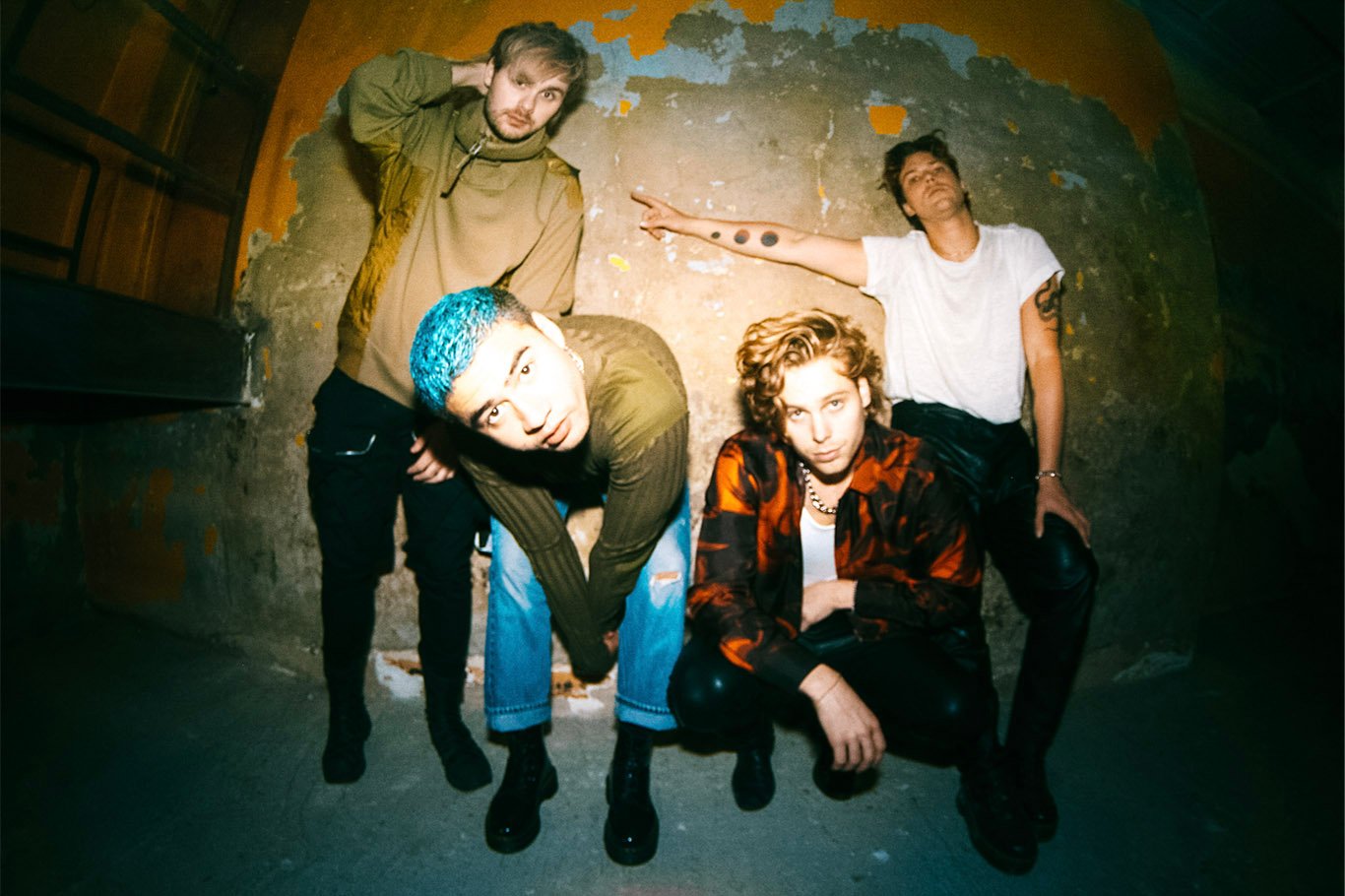
5 Seconds of Summer
For so long, ‘pop’ was a dirty word; especially when coupled with ‘boy band’. In my eyes, 5 Seconds of Summer have completely dismantled these stigmas as one of the best acts to ever come out of Australia. I don’t think they've put a foot wrong. In the past, boy bands have usually played it safe to appeal to a wider audience.
So as a fellow pop artist, I am so in awe of the risks they take and the boundaries they push; sonically, lyrically and aesthetically. I also love that their audience spans across all ages. From 13-year-olds to 27-year-olds like myself! All of their songs have something, whether it's a lyric or a melody we can sink our “Teeth” (also a great track) into.
"I am so in awe of the risks they take and the boundaries they push."
With their roots being in punk, rock, I love the way they have paired this with pop and kept the sound so true to themselves. When you listen to “She Looks So Perfect”, which was released in 2014, and then “Youngblood” in 2018, you can distinctly hear how they have embraced the pop influence and integrated their rock roots.
I remember hearing “Youngblood” for the first time on my way to a recording session and thinking it was the coolest drum rhythm I’ve ever heard for a chorus. It was so fresh and so different. I can confidently say they gave me so much inspiration when writing my own music and confidence to push sounds that weren't always commonly used or heard on the radio.
Every song after “Youngblood” got even better. “Ghost of You”, “Want You Back”, “Lie to Me”... all were nothing like you’ve ever heard before. What I like most about their music is that it’s pop, but with a twist. You can hear a rock influence throughout all of their songs but at the same time, none of them sounds the same.
Cohesion is something that is hoped for by an artist, but is usually really hard to achieve. With 5SOS, I can always tell what song is theirs but always be surprised at the same time.
I won't lie, I’ve had their latest album, Calm, on repeat over the last year and it's definitely gotten me through some tough moments. When lockdown was lifted in NSW, Australia I would often just drive and play “Wildflower” on repeat. GOD BLESS 5SOS. Thank God one good thing came out of 2020.
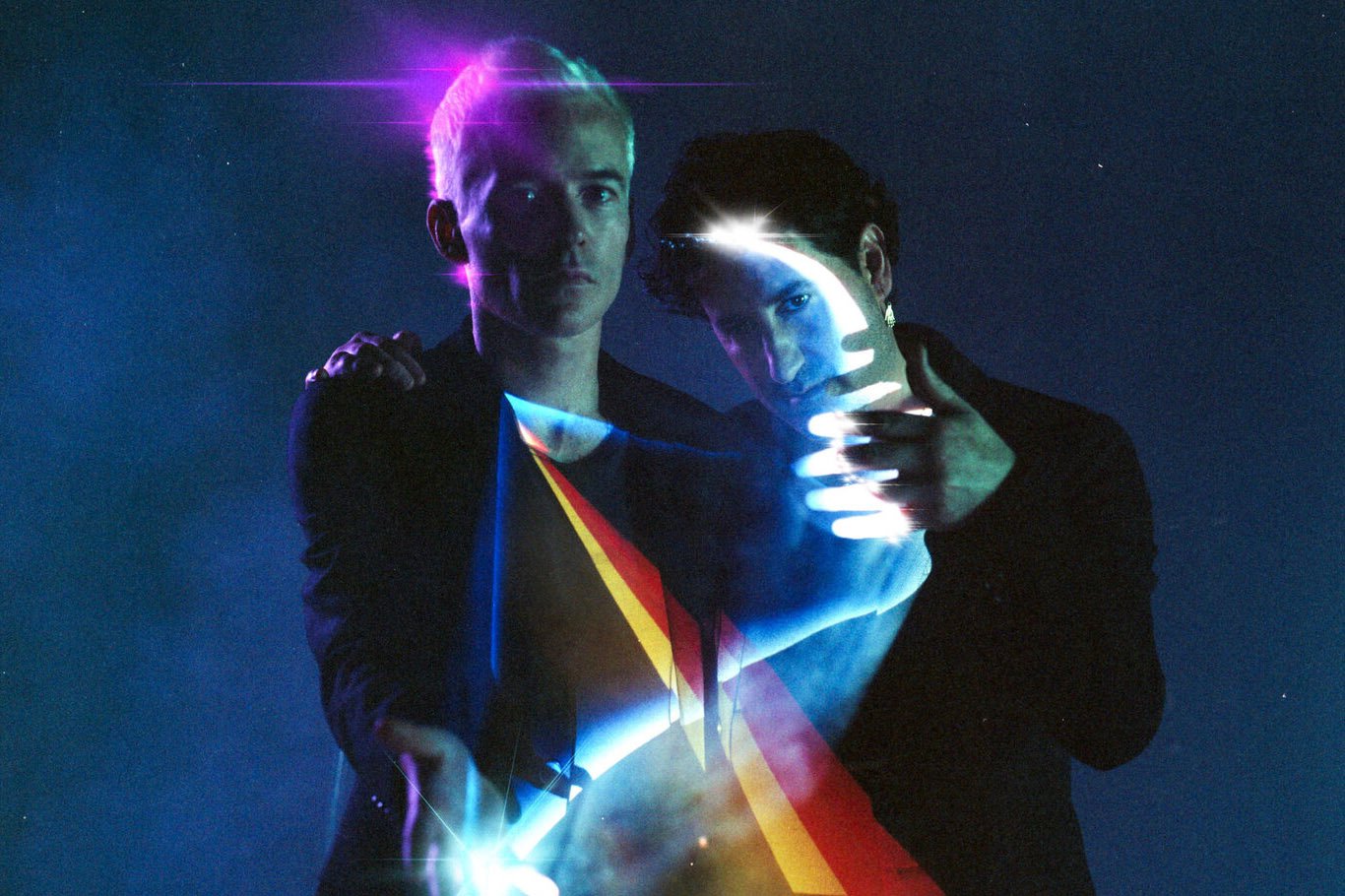
The Avalanches
It would have been hard to imagine the idea of “punk” before Iggy and The Stooges exploded onto stage, showing wide-eyed kids what was possible. And in the same way, it’s hard to imagine the existence of our Australian electronic music scene without the breakthrough success of oddball cult heroes The Avalanches.
To really understand this, you have to forget about the flourishing electronic scene that now exists in this country, and imagine your way back to the indie-dominated music landscape of Australia in the late Nineties. Back then, electronic music was just not part of the conversation. If a band didn’t have fuzzy guitars, sideburns, and a chain wallet, people just didn’t want to know about it. And anyone like me who obsessed over electronic music were forced to look to the sounds coming from the UK or US to scratch the itch… until The Avalanches came along.
I first saw them play at the old Evelyn Hotel band room in Melbourne in front of 20 people, supporting Jimi Tenor. My first reaction was “what kind of music even is this?”. They had synths, samplers, and live instruments, but over the course of their set proceeded to destroy the stage and their instruments. Yet somehow, through all the chaos, there was something bizarrely infectious that hit like a force of nature. My wide-eyed teenage self walked away thinking that this was like nothing I’d ever heard before.
"My first reaction was 'what kind of music even is this?'"
Shortly after that I was lucky enough to get signed to the same label as The Avalanches. We became good friends, bonding over a mutual love of records, and we had a ritual of a street basketball game each afternoon with a random assortment of other musicians and friends. But suddenly when their debut album, Since I Left You, was released, we found our basketball game on permanent hold.
That moment transported The Avalanches from a local oddity playing gigs to 20 people, into being one of the most unique, internationally loved electronic acts. Suddenly the world was watching. It was the kind of record that would have seemed impossible before they went out and actually made it. Their finesse with layering samples really changed expectations of what could be done with sampling as an artform, to the point where two decades on, it has never been surpassed. In that moment it focused international eyes on Australian electronic music for the first time as something to watch.
To me The Avalanches bring out what is most special about music, because you can hear the love they have for it. Great music is sacred. It’s not something to be churned out, it’s the magical essence of melody and lyric that can take you back to the best moments of your life. And throughout their career they have harvested these moments from all eras of music, then painstakingly stitched them together in an impossibly detailed tapestry for everyone to enjoy.
Parts of that tapestry feel joyously familiar, like a favourite pair of vintage jeans that fit in the most satisfying way. But then wedged next to it would be a different sound, so bizarre that it could have been made in a laboratory or beamed to us by aliens. Somehow in the hands of The Avalanches these moments just make sense. They have forged a career from making the impossible possible, and that’s their genius.
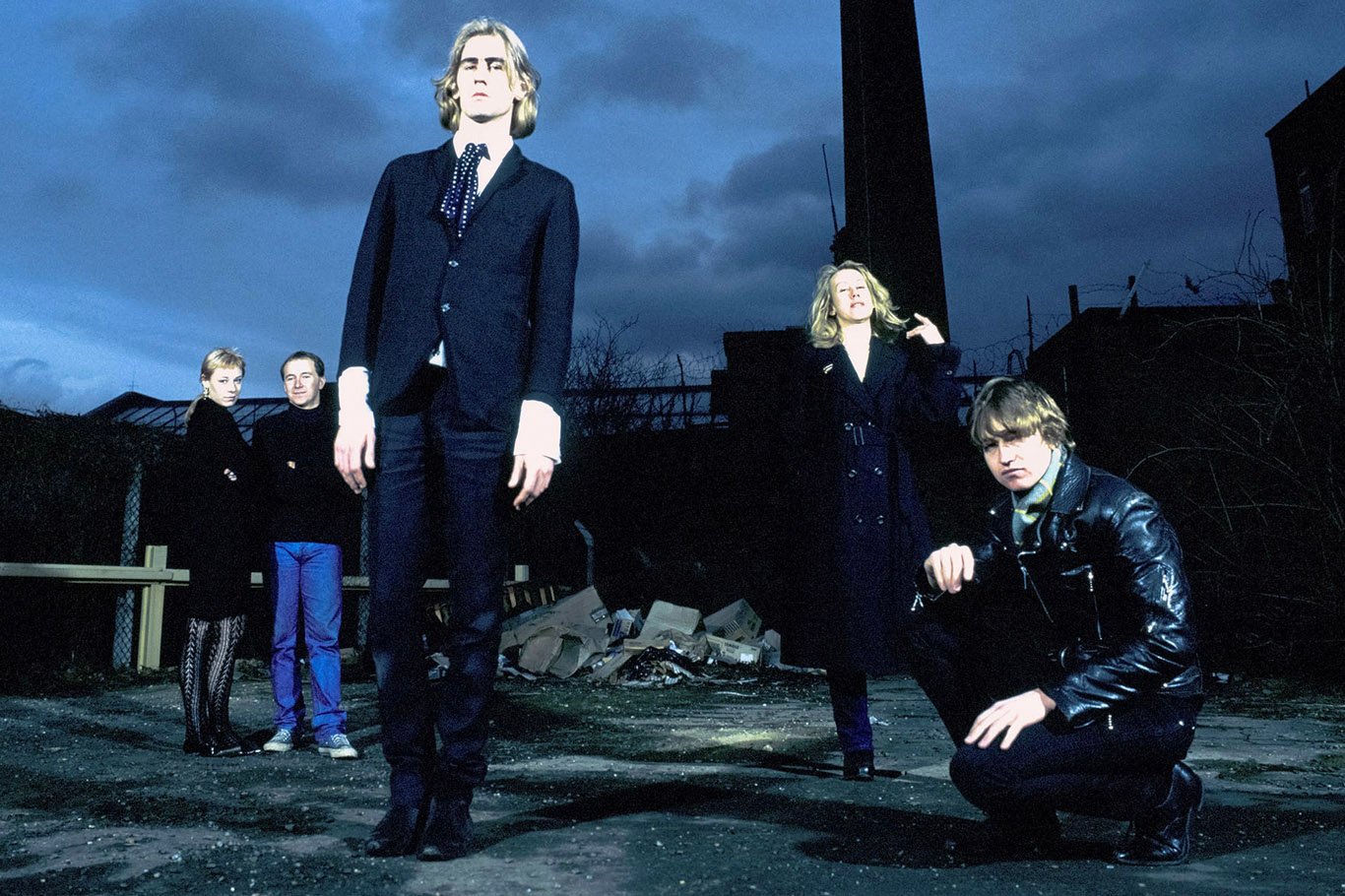
The Go-Betweens
The striped sunlight sound. Film students. Bookish boys. Bashful types. A thing for romance. Memory details nostalgia. Australia. Queensland. The heat, the humidity, the tropics, the weird lazy anachronism that Brisbane was. Those warm and balmy nights. Bob Dylan and Tom Verlaine. Bergman and Cocteau. Talk deep into the night. Not often you meet a guy who understands.
The father who died much too early, yet present in so much of Grant McLennan’s thoughts and music. Robert Forster angular and lanky, strumming his guitar and observing all the usual malarkey with detached gentle amusement. Grant singing out with his unfocused stare that seemed like he was receiving direct spirit. Imagine as they discover they both have incredible idiosyncratic voices. Robert’s more casual Lou Reed to Grant’s soft but resonant voice. The two voices together were just perfect.
As an acoustic duo, they were poignant, funny, melancholic, and all that other stuff. Above all else they were great players and singers and they interlocked like synchromesh. The blonde woman, Lindy Morrison, on the drums (she had been in some real bands). They come out the box seemingly fully formed. They are Australian in a new way. They’ve got an angle on Australia. No one has done it like this before.
"No one has done it like this before."
The records got better and better. Robert Vickers joined, and then Amanda Brown. Defying the zeitgeist, they were a blend of amateurish, mercurial, intuitive, naive, nostalgic, and romantic. Critics loved ‘em. “Cattle and Cane” comes along in that weird time signature. Such a classic song that by now, it defies analysis. And yes, by golly, a bit of a hit. Yeah, they like The Go-Bees in England and Europe too. Grant lights a Peter Stuvo and blows it out of his mouth sideways. “I took the wrong road round.” Robert frowns inscrutably.
“Keep me away from her.” The violin and the female voice singing tuneful youthful backups. The possibility of intergroup romances à la Fleetwood Mac. Try to crack London in the cold damp miserable winter. You can’t heat up the flat with good reviews. The songs get better and better. They both explore each other’s territory and Grant can do weird and edgy, and Robert can do tender with only the tiniest bit of ironic glaze. Eventually there is 16 Lovers Lane with absolutely not one duff track, and every single song as good as every other song. Johnny Wilsteed is now playing bass and adding lovely acoustic guitar frills. It’s one of those classics. It just is.
After that it kinda fell apart a bit. Robert and Grant released a few well acclaimed solo records. I guess in the late Nineties they drift back towards each other. Then back together officially and after a few okay records they miraculously hit upon Oceans Apart. Wherein it all fell back into place. Robert was wry. Grant was wistful. The magic was back. The Go-Betweens deserve that bridge they got in Brisbane. There was simply no one else like them. And to me that is always the most important thing. Yeah, they were unique.

The Saints
The Saints were always a band of misfits, a musical slap in the face to the bland conformity of Brisbane in the Seventies. Inspired by The Stooges and the MC5, Ed Kuepper developed a pummelling, explosive guitar attack that was made even more vitriolic by Chris Bailey’s snarky vocals. Gathering a motley assortment of die-hard followers around them, by 1976 The Saints were a revolution waiting to happen.
Unbeknownst to them, there were plenty of other disaffected music fans around the world who were also looking for some hard-edged thrills after the collapse of rock’n’roll into pomposity and self-parody in the early Seventies. When Kuepper heard the Ramones album, he was crestfallen to discover that someone else had beaten The Saints to the punch. Chris Bailey told one UK blogger about getting a call from the guitarist saying, “the Ramones have stolen our sound”. Kuepper told the same interviewer, “I was surprised at the way it sounded. But their only influence was that I decided never to wear a leather jacket onstage”.
The Ramones may have gotten the jump on The Saints but after a gushing review in the UK’s Sounds Magazine in October 1976, The Saints’ independent single, “(I’m) Stranded”, became the shot heard around the world. EMI Australia were nonplussed at being ordered by their head office to sign up this band of musical malcontents. They were even more mystified when they finally got to see the band perform in Sydney.
"By 1976 The Saints were a revolution waiting to happen."
Notably, at one of those performances Kuepper even changed a guitar string during a song without missing a beat. The caterwauling sound of a string being slowly tuned up to pitch as he continuously flailed away only added to the din - and to the lack of comprehension among the gathered execs. Forget Brisbane, The Saints couldn’t have appeared more alien if they had flown in from Alpha Centauri.
In May 1977, The Saints left an indifferent Australian music industry far behind and decamped to London where they were initially greeted as punk saviours. Of course, The Saints weren’t having a bar of that. Their defiantly anti-style of dress was sharply at odds with the post-Glam revolutionary chic of punk fashion and, horror of horrors, some of the band even had long hair! For The Saints, UK punk presented another set of rules to be flouted and they soon found themselves in their familiar role of outsiders once again.
In a way, that first lineup of The Saints reached its zenith with ‘“(I’m) Stranded”, both the single and the album. There were many brilliant songs on the next two albums and, for my money, the single “This Perfect Day” was the most explosive the band ever sounded on record but, musically, they appeared to lose cohesion. Australia had been hostile but, in the end, London was equally unwelcoming. Somehow the anger and energy that had been turned outwards against an unfriendly world now began to turn inwards.
In September 1978, just after releasing their third album, Prehistoric Sounds, The Saints dissolved in ignominy and acrimony. History has been kinder to the band than the world was when they were around. In some ways, the only musical revolutions that matter are the ones the vinyl makes as it spins around the turntable. That’s a revolution where The Saints will always come out ahead of most of their contemporaries.

Crowded House
When I first met Neil in 1982, I was gobsmacked to learn that he hated Steely Dan. Everybody else loved them! What sort of a person couldn’t acknowledge the precocious catchiness of those intricate chord progressions, the clever dick harmonies and the stinky, dirty grooves? The point is, Neil has always been his own man and held his own convictions. I reckon if you are a true original, that’s a big part of it.
Cutting his songwriting/performing teeth in the Split Enz years was like doing your law degree at Harvard. You emerged bona fide. No one’s going to argue that point. Neil Finn and Crowded House were bona fide! Their first album reached number 12 on the US charts and “Don’t Dream It’s Over” went to number two on the Billboard charts, number one in a shit-tonne of places around the world, and we’ve been hearing it ever since as covers and in movies and TV shows. Not bad.
Neil had already proven his hit songwriting chops with “I Got You”, but this took him and the band to a whole new level. So many of their songs deserve that amount of kudos though. Too many to mention but “Hole In the River” still haunts me, “Into Temptation”, “When You Come” (“underneath the heavens, with the stars burning and exploding”), “Private Universe”... and on, and on, and on.
"They were cocky buggers, but you’re allowed to be when you back it up with that much talent."
The chemistry between Neil, Nick, and Paul can’t be ignored as a source of their originality and consequently, their appeal. The easy patter they developed onstage became part of fans expectations alongside their no-holds-barred energy and that irreverence. Neil has always been a consistently awe-inspiring live performer and communicator but there’s no doubting Paul Hester was often the glue that held it all together. He was funny and astute and could read a room. I know his loss is still a source of desperate sadness to Neil and Nick, and probably every single Crowdies fan.
Tim Finn’s involvement in 1990/91, although short, was very sweet. It has always felt like a privilege listening to the melding of the brothers’ music genes. They are each other’s sharpest prism so each time one's shine bounces off the other, something magical happens. Live gigs were an adventure. I loved the combination of deep emotional expression, technical excellence, originality, and uninhibitedness. They were cocky buggers, but you’re allowed to be when you back it up with that much talent.
P.S: Paul McCartney told me Neil Finn is one of his favourite songwriters.

The Easybeats
When you’re in a moderately successful local band, you play some...interesting shows. Sometimes they’re electrifying and in front of thousands. Sometimes they’re electric shocks from a dodgy PA in front of dozens. So when in the early Noughties, my band Klinger were added to a St Patrick’s Day lineup opening for erstwhile Easybeats frontman Stevie Wright, we were pretty dang chuffed.
As I packed up my guitar side of stage after our set of fizzy guitar pop, Stevie effing Wright was being helped on stage. He was frail but still had his pipes about him and rolled out the hits. It was sometime during “She’s So Fine” that something clicked (possibly the broken latch on my Jazzmaster case) and I felt I was part of the great tradition of Australian guitar music.
Music that you can trace back through Tim Rogers, through Deniz Tek, through Lobby Lloyde, and back to The Easybeats. I might have been coming at it from an ironic, indie, late Nineties Punters Club direction, but it was all triggered by those stuttering George Young chords that kick off “She’s So Fine”.
It’s easy to refract The Easybeats through the culture they influenced. Through the Nineties Big M ads they soundtracked or the Jimmy Barnes and INXS covers they sparked, or through what came later when George’s little brothers blew it all wide open, with George and Harry behind the desk. But sometimes you just have to go back to the source. Listen to the opening four bars of “Bring A Little Lovin’”. The Easybeats were a force.
The whipping guitar. Snowy’s drums, in turns pounding and skittery. The edge to Stevie’s voice. And Vanda and Young creating the template for hard rock guitars, before it was a GarageBand plug-in. Going back to the source can inspire you to unplug the synth plug-ins and just play some goddamn guitar. Preferably with someone wailing over the top, fizzing on diet pills. That’s the stuff. Pure and hard and why generations of Aussies have shouted into a pub microphone that smells like beer and Glen 20.
"Listen to the opening four bars of 'Bring A Little Lovin''. The Easybeats were a force."
It’s worth noting, I suppose, that the quintessential Australian guitar band comprised of exactly zero Australians. But hey, we’re a nation of (mostly) immigrants, and as a culture we benefit from what we import. Holland in the Sixties was a melting pot of guitar music, with US troops leaving R&B records behind and newly arrived Dutch-Indonesian kids electrifying Pacific guitar.
So it’s worth musing whether there would be any pub rock without Harry Vanda (nee Johannes Hendrikus Jacob van den Berg). Or musing what might have happened if he hadn’t met George Young at Villawood. Maybe we wouldn’t have had the first truly global Australian band, long before INXS, or Jet, or Courtney Barnett.
But wherever it came from, and wherever it was headed, on that St Patrick’s Day night on a patch of grass in Carlton, guitar music was alive and well. My guitar packed, I watched on from the side stage. Just for a moment, I was part of it.

































